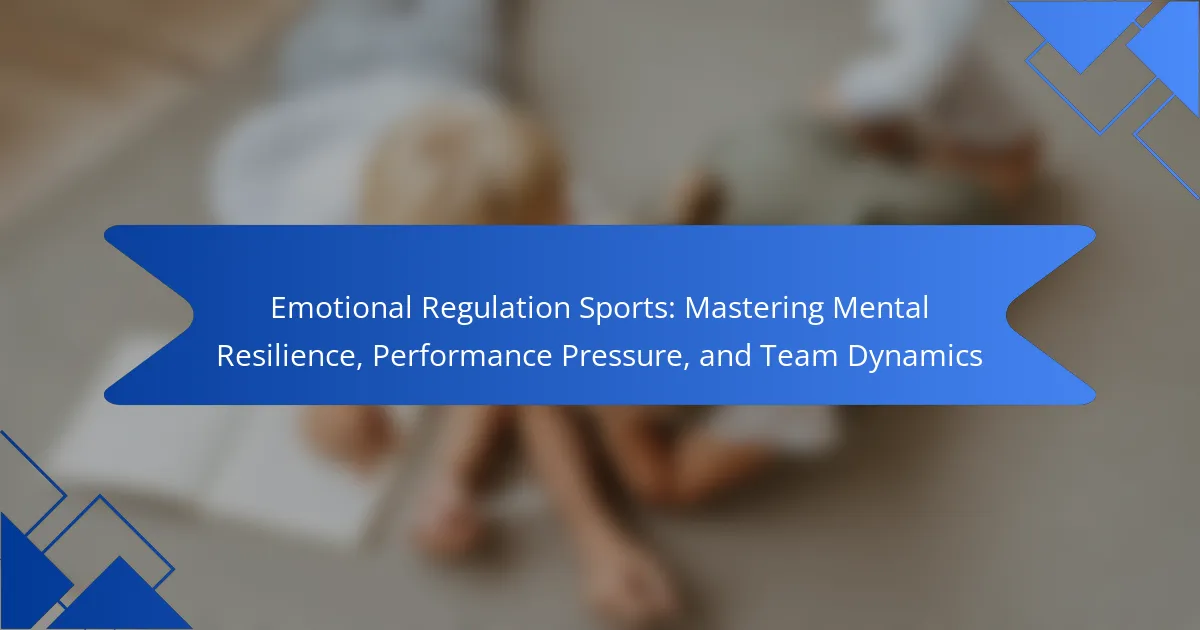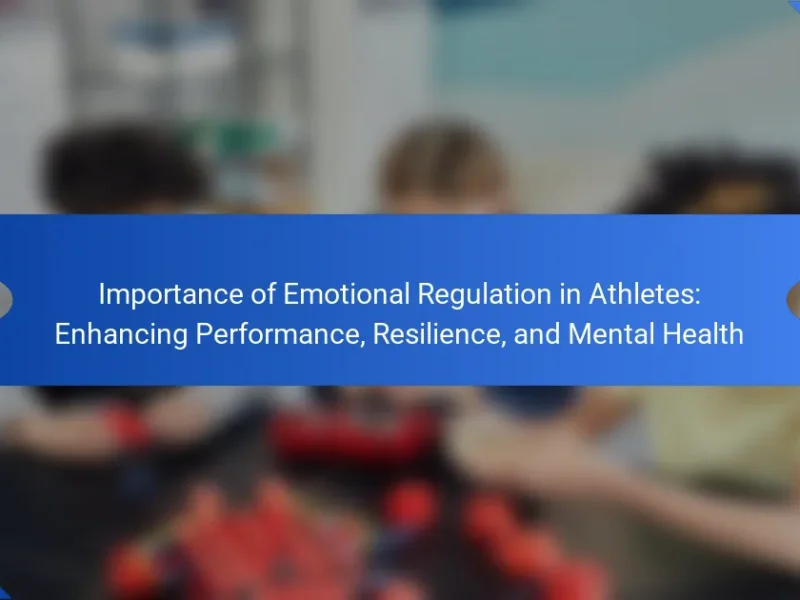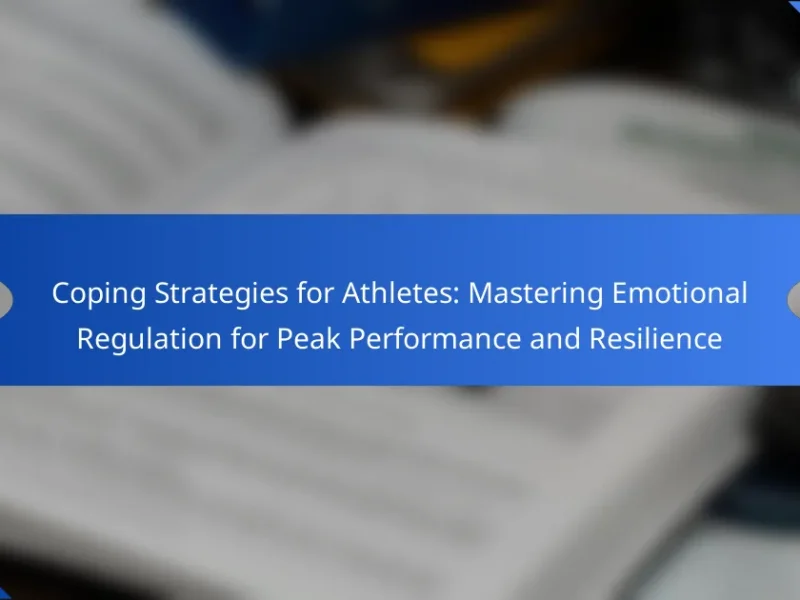Emotional regulation in sports is crucial for enhancing mental resilience, managing performance pressure, and improving team dynamics. Athletes who effectively regulate their emotions can maintain focus, reduce anxiety, and recover from setbacks. Key strategies include mindfulness, cognitive restructuring, and self-awareness, which collectively foster a supportive environment for individual and team success. Research highlights the correlation between emotional regulation and improved performance metrics, emphasizing its importance in competitive sports.
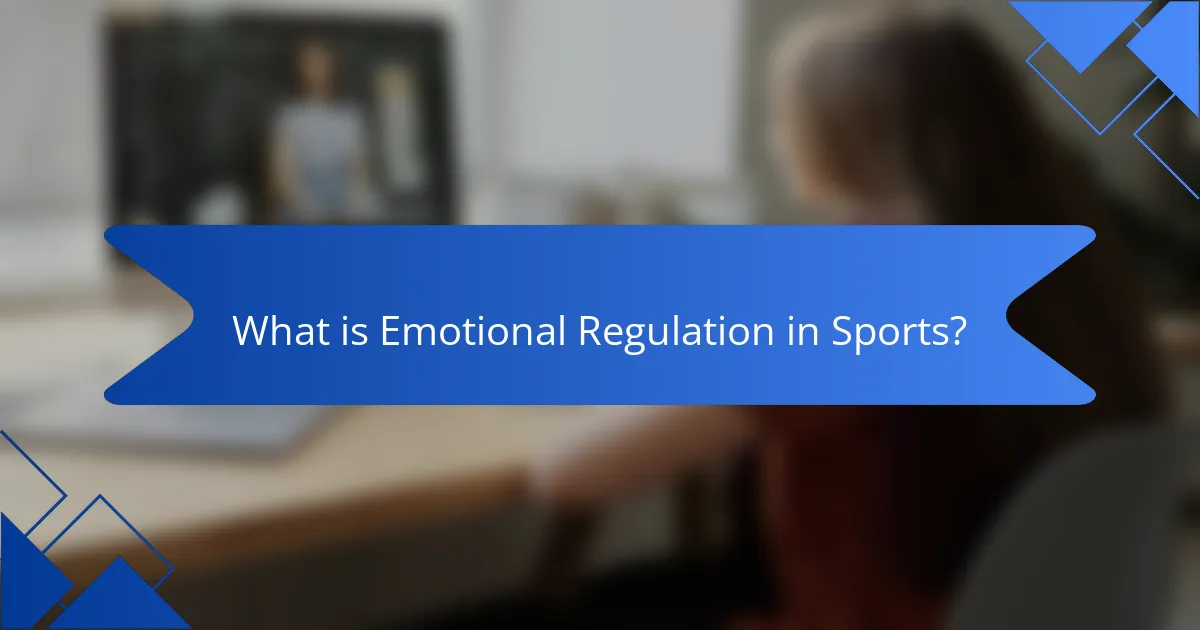
What is Emotional Regulation in Sports?
Emotional regulation in sports involves managing emotions to enhance performance and teamwork. Athletes who master emotional regulation can maintain focus under pressure, leading to improved outcomes. Effective strategies include mindfulness, cognitive restructuring, and self-talk, which help athletes navigate challenges and foster resilience. Research indicates that emotional regulation correlates with better performance metrics and stronger team dynamics, highlighting its critical role in sports success.
How does Emotional Regulation impact Athletic Performance?
Emotional regulation significantly enhances athletic performance by fostering mental resilience, managing performance pressure, and improving team dynamics. Athletes who effectively regulate their emotions can maintain focus and composure during high-stress situations. For instance, studies indicate that athletes with strong emotional control experience lower anxiety levels, leading to better decision-making and execution of skills. Additionally, emotional regulation promotes positive communication and collaboration among team members, which is crucial for team sports. By mastering emotional regulation, athletes can optimize their performance and achieve consistent results.
What are the key components of Emotional Regulation Systems?
Emotional regulation systems in sports focus on managing emotions to enhance performance and team dynamics. Key components include self-awareness, emotional control, cognitive appraisal, and social support. Self-awareness allows athletes to recognize their emotional states. Emotional control involves techniques to manage negative emotions during competition. Cognitive appraisal refers to interpreting situations positively to reduce stress. Social support fosters a collaborative environment, enhancing resilience and performance under pressure.
What role does self-awareness play in Emotional Regulation?
Self-awareness is crucial for emotional regulation in sports, enhancing mental resilience and performance. It allows athletes to recognize their emotions and triggers, leading to better control over responses. This skill fosters team dynamics, as self-aware individuals contribute positively to group morale and communication. Moreover, studies indicate that athletes with high self-awareness tend to perform better under pressure, showcasing a unique attribute of emotional intelligence. Developing this awareness can significantly impact overall athletic performance and well-being.
How do coping strategies enhance Emotional Regulation?
Coping strategies significantly enhance emotional regulation by equipping athletes with tools to manage stress and maintain focus. These strategies foster mental resilience, enabling individuals to perform under pressure and navigate team dynamics effectively. Techniques such as mindfulness, cognitive restructuring, and positive self-talk empower athletes to regulate their emotions, leading to improved performance outcomes. Research indicates that athletes who employ coping strategies report lower anxiety levels and higher satisfaction with their performance.

What are the Universal Benefits of Emotional Regulation in Sports?
Emotional regulation in sports enhances mental resilience, optimizes performance under pressure, and improves team dynamics. Athletes who master emotional control can maintain focus, reduce anxiety, and recover quickly from setbacks. Research shows that effective emotional regulation correlates with higher performance levels and better teamwork. Additionally, it fosters a positive environment, encouraging collaboration and communication among team members.
How does Emotional Regulation improve mental resilience?
Emotional regulation enhances mental resilience by equipping athletes to manage stress and maintain focus under pressure. It fosters adaptability, enabling quick recovery from setbacks. Research indicates that athletes with strong emotional regulation skills perform better, especially in high-stakes situations. This ability also promotes positive team dynamics, as emotionally regulated individuals contribute to a supportive environment, enhancing overall performance.
What effect does Emotional Regulation have on team dynamics?
Emotional regulation significantly enhances team dynamics by fostering communication, trust, and collaboration. Teams with members skilled in emotional regulation manage conflicts better and maintain focus under pressure. This leads to improved performance and cohesion. Research indicates that teams exhibiting high emotional intelligence, a component of emotional regulation, show a 20% increase in productivity and a 30% boost in morale. By mastering emotional regulation, teams can navigate challenges effectively, creating a resilient environment that promotes success.
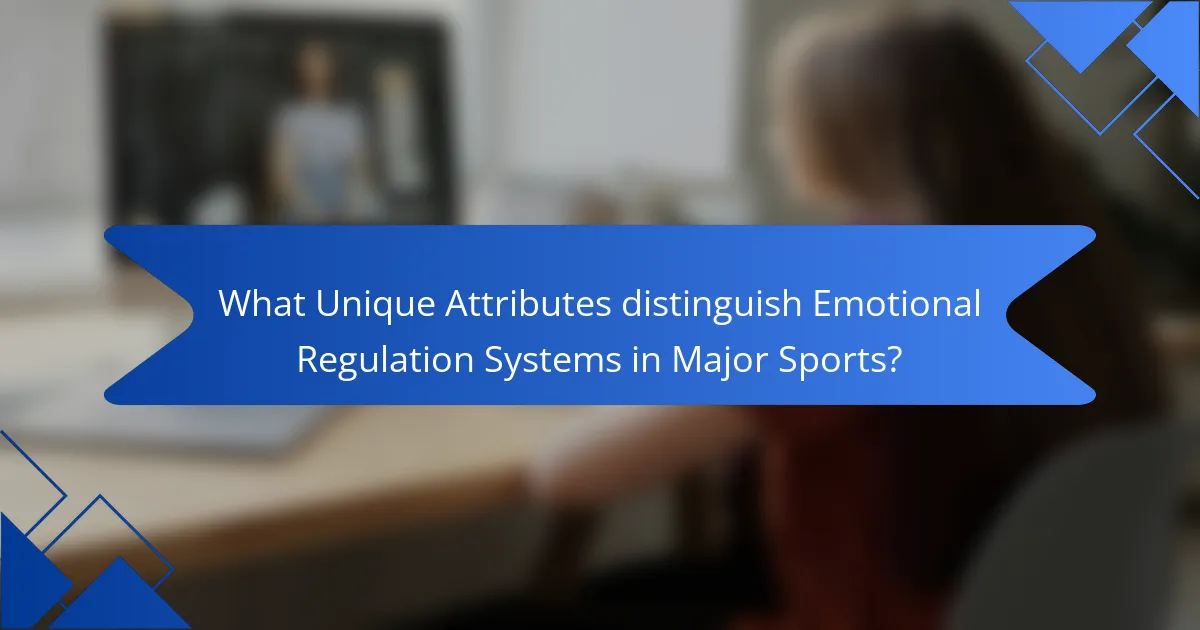
What Unique Attributes distinguish Emotional Regulation Systems in Major Sports?
Unique attributes that distinguish emotional regulation systems in major sports include mental resilience, performance pressure management, and team dynamics adaptation. Mental resilience enables athletes to withstand challenges and setbacks. Performance pressure management involves techniques to maintain focus and composure during high-stakes situations. Team dynamics adaptation ensures effective communication and collaboration among team members, enhancing overall performance. These attributes collectively foster a supportive environment that promotes individual and team success.
How do different sports adopt Emotional Regulation techniques?
Different sports adopt Emotional Regulation techniques to enhance performance and maintain mental resilience. Techniques vary by sport but generally include mindfulness, visualization, and breathing exercises.
For example, basketball players often use visualization to imagine successful shots, while soccer players may practice deep breathing to manage anxiety during high-pressure moments. These methods help athletes control emotions, improve focus, and foster team dynamics.
Unique attributes of emotional regulation in sports include tailored strategies that align with specific performance demands. For instance, individual sports like tennis emphasize self-talk, while team sports like football focus on collective emotional management.
As a result, athletes across various sports can cultivate mental resilience, ultimately leading to improved performance outcomes and stronger team cohesion.
What are some innovative practices in Emotional Regulation for athletes?
Athletes can enhance emotional regulation through practices such as mindfulness, cognitive restructuring, and visualization techniques. Mindfulness helps athletes stay present, reducing anxiety and improving focus. Cognitive restructuring allows for reframing negative thoughts, fostering a positive mindset. Visualization techniques enable athletes to mentally rehearse performance scenarios, boosting confidence and emotional control. These innovative practices enhance mental resilience, crucial for managing performance pressure and improving team dynamics.

What Rare Attributes are found in Emotional Regulation Systems?
Rare attributes in emotional regulation systems include adaptability, emotional granularity, and resilience under pressure. These attributes enhance an athlete’s ability to maintain focus and composure during competition. Adaptability allows for quick adjustments to emotional responses, while emotional granularity facilitates nuanced understanding of feelings. Resilience under pressure ensures sustained performance despite challenges.
How do elite athletes utilize Emotional Regulation differently?
Elite athletes utilize emotional regulation by employing advanced techniques to manage stress, enhance focus, and foster teamwork. They often engage in mindfulness practices, cognitive restructuring, and emotional awareness to maintain peak performance under pressure. These strategies help them navigate competition challenges, leading to improved mental resilience and better outcomes. For instance, elite athletes may use visualization to prepare for high-stakes situations, enhancing their ability to regulate emotions effectively.
What unique challenges do athletes face in Emotional Regulation?
Athletes face unique challenges in emotional regulation due to performance pressure, team dynamics, and mental resilience demands. High expectations can lead to anxiety, impacting focus and execution. Team interactions may create conflicts or stress, complicating emotional management. Additionally, the need for constant mental toughness can result in burnout if not addressed. Understanding these challenges is crucial for developing effective coping strategies.
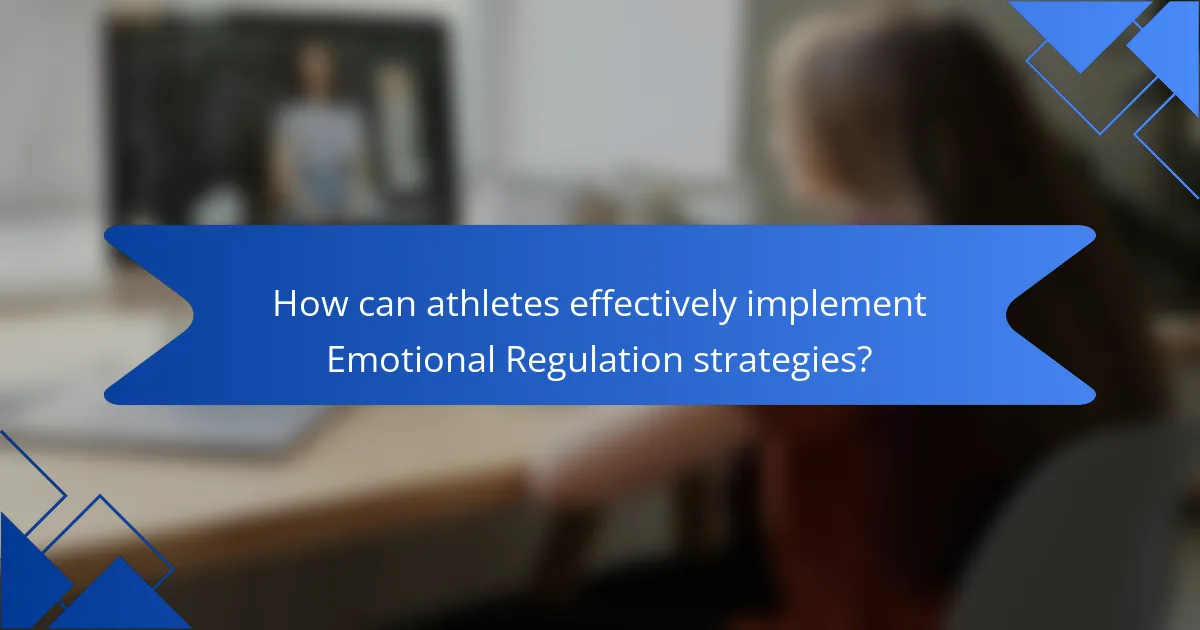
How can athletes effectively implement Emotional Regulation strategies?
Athletes can implement Emotional Regulation strategies by practicing self-awareness, mindfulness, and cognitive restructuring. These techniques enhance mental resilience, allowing athletes to manage performance pressure effectively. Self-awareness helps identify emotional triggers, while mindfulness fosters present-moment focus. Cognitive restructuring aids in reframing negative thoughts into positive affirmations, promoting a constructive mindset. Regular practice of these strategies leads to improved team dynamics and overall performance.
What are the best practices for developing Emotional Regulation skills?
To develop emotional regulation skills in sports, focus on mindfulness, self-awareness, and adaptive coping strategies. Practicing mindfulness enhances present-moment awareness, helping athletes manage performance pressure effectively. Self-awareness allows individuals to identify emotional triggers, fostering proactive responses. Adaptive coping strategies, such as positive self-talk and visualization, build mental resilience and improve team dynamics. Regularly engaging in these practices can lead to sustained performance improvements and better emotional health.
How can visualization techniques enhance Emotional Regulation?
Visualization techniques significantly enhance emotional regulation by providing athletes with mental tools to manage stress and anxiety. These techniques improve focus, increase self-awareness, and foster positive emotions. For instance, imagery exercises allow athletes to mentally rehearse performance scenarios, leading to better emotional control under pressure. As a result, visualization strengthens mental resilience, enabling athletes to respond effectively to challenges and maintain team dynamics.
What role does feedback play in Emotional Regulation development?
Feedback is crucial for developing emotional regulation in sports, as it enhances self-awareness and coping strategies. Constructive feedback helps athletes identify emotional triggers and adjust their responses under performance pressure. Regular feedback fosters mental resilience, allowing athletes to learn from experiences and improve team dynamics. Athletes who effectively integrate feedback demonstrate better emotional control, leading to improved performance outcomes. This unique attribute of feedback in emotional regulation contributes significantly to overall athletic success.
What common mistakes should athletes avoid in Emotional Regulation?
Athletes should avoid common mistakes in emotional regulation to enhance performance. Key errors include neglecting self-awareness, which can lead to poor emotional responses. Failing to develop coping strategies results in heightened stress during competition. Ignoring team dynamics creates misunderstandings, undermining collaboration. Lastly, underestimating the importance of mental training limits resilience against pressure.
What expert insights can guide athletes in mastering Emotional Regulation?
Athletes can enhance emotional regulation through mindfulness, cognitive restructuring, and effective communication. Mindfulness practices help in recognizing and managing emotions during performance pressure. Cognitive restructuring allows athletes to reframe negative thoughts, fostering resilience. Effective communication within team dynamics promotes emotional support and collaboration. These strategies collectively build mental resilience, crucial for peak performance.
